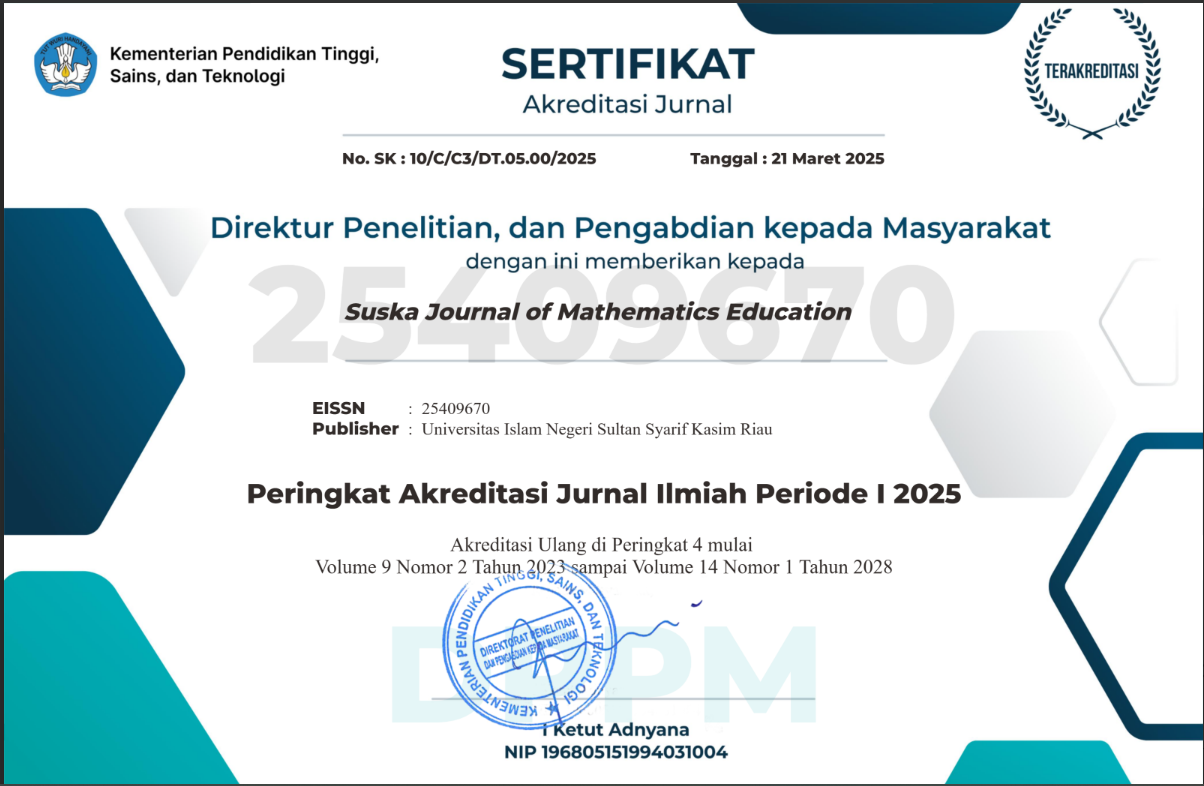Kecemasan dan Kebiasaan Belajar Matematika Terhadap Keterampilan Berpikir Kritis Siswa
Abstract
This study aims to examine the anxiety and study habits of mathematics on students' critical thinking skills. This research approach is a quantitative approach to the type of ex post facto research. The population in this study were students of MA Tarbiyatul Muta’alimin Kabupaten Cirebon. The sampling technique in this study uses purposive sampling. As for the research sample of 40 students. Data collection techniques used were closed questionnaires and mathematical tests. The data analysis technique uses inferential statistical techniques consisting of normality test, linearity test, multicollinearity test and hypothesis testing using linear regression analysis. Based on the results of data analysis, mathematical anxiety shows a moderate criterion of 60%, an average of 44.3 and a standard deviation of 8.05; mathematics learning habits show moderate criteria at 45%, an average of 92.9, and a standard deviation of 140.96; Critical thinking skills of students showed moderate criteria at 55%, an average of 5.45, and a standard deviation of 1.218. In addition, the results of data analysis show that there is an influence of anxiety and study habits of mathematics together on students' critical thinking skills. The amount of influence that is equal to 15.60% with the contribution of the influence of mathematics anxiety of 13.20% and learning habits of mathematics by 5.90%. Then the multiple linear regression equation, i.e. = 16,998 – 0,042.X1 – 0,014.X2.
Keywords
Full Text:
PDFReferences
Agustyaningrum, N., & Suryantini, S. (2017). Hubungan kebiasaan belajar dan kepercayaan diri dengan hasil belajar matematika siswa kelas VIII SMP N 27 Batam. JIPMat, 1(2). 158 – 164
Aunurrahman, D. (2009). Belajar dan pembelajaran. Bandung: Alfabeta.
Carey, E., Hill, F., Devine, A., & Szücs, D. (2015). The Chicken or the Egg? The Direction of the Relationship Between Mathematics Anxiety and Mathematics Performance. Frontiers in psychology, 6, 1987-1987.
Daradjat, Z. (2001). Kesehatan Mental, Jakarta: PT. Toko Gunung Agung.
Desmita. (2010). Psikologi Perkembangan Peserta Didik. Bandung: Remaja Rosdakarya.
Deswani. (2009). Proses Keperawatan dan Berpikir Kritis. Jakarta: Salemba Medika
Diana, R. B. (2019). Memberdayakan Kemampuan Berpikir Kritis dan Adaptasi Melalui Realistic Mathematics Education (RME). Pediamatika, 1(2). 59-67
Djaali, H. (2008). Psikologi pendidikan. Jakarta: Bumi Aksara.
Ennis, R. (1995). Critical Thinking. New Jersey: Prentice Hall
Etikan, I., Musa, S. A., & Alkassim, R. S. (2016). Comparison of convenience sampling and purposive sampling. American journal of theoretical and applied statistics, 5(1), 1-4.
Everingham, Y. L., Gyuris, E., & Connolly, S. R. (2017). Enhancing student engagement to positively impact mathematics anxiety, confidence and achievement for interdisciplinary science subjects. International Journal of Mathematical Education in Science and Technology, 48(8), 1153-1165.
Fariha, M. (2012). Kemampuan Berpikir Kritis Matematis dan Kecemasan Matematika dalam Pembelajaran dengan Pendekatan Problem Solving (Studi Eksperimen pada Kelas X MAN Rukoh Kota Banda Aceh). Jurnal Peluang, 1(2). 43-50
Giuffre, M. (1997). Designing research: Ex post facto designs. Journal of PeriAnesthesia Nursing, 12(3), 191-195.
Goldenberg, E. P., Shteingold, N., & Feurzeig, N. (2003). Mathematical habits of mind for young children. Teaching mathematics through problem solving: Prekindergarten-Grade, 6, 51-61.
Gunawan, A. (2007). Genius Learning Strategy. Jakarta: PT. Gramedia Pustaka Utama
Gupitasari, G. (2015). Penurunan Kecemasan dan Peningkatan Kemampuan Berpikir Kritis Matematis Siswa SMP Melalui Model Pembelajaran Knisley (Doctoral dissertation, Universitas Pendidikan Indonesia).
Hadjam, M. N. R., & Widhiarso, W. (2015). Pengujian model peranan kecakapan hidup terhadap kesehatan mental. Jurnal Psikologi, 38(1), 61-72.
Hara, K. (1995). Quantitative and qualitative research approaches in education. Education, 115(3), 351-356.
I Gede, T. (2010). Efektivitas Konseling Behavioral dengan Teknik Desensitisasi Sistematis untuk Mereduksi Kecemasan Menghadapi Ujian: Studi Eksperimen pada Siswa Kelas X SMA Negeri 2 Singaraja Tahun Ajaran 2010/2011 (Doctoral dissertation, Universitas Pendidikan Indonesia).
Imro’ah, S., Winarso, W., & Baskoro, E. P. (2019). Analisis Gender terhadap Kecemasan Matematika dan Self Efficacy Siswa. Kalamatika: Jurnal Pendidikan Matematika, 4(1), 23-36.
Maemanah, A., & Winarso, W. (2019). Pengaruh Kecerdasan Logika Matematika Terhadap Disposisi Matematis Siswa. Jurnal Review Pembelajaran Matematika, 4(1), 48-57.
Montague, M., & Applegate, B. (2000). Middle school students' perceptions, persistence, and performance in mathematical problem solving. Learning Disability Quarterly, 23(3), 215-227.
Nurhayati, E. (2016). Psikologi pendidikan inovatif (Vol. 2). Yogyakarta: Pustaka Pelaiar.
Paul, R., & Elder, L. (2019). The nature and functions of critical & creative thinking. Rowman & Littlefield.
Purnamaningsih, E. H. (2003). Kepercayaan diri dan kecemasan komunikasi interpersonal pada mahasiswa. Jurnal Psikologi, 30(2), 67-71.
Saputra, P. R. (2017). Kecemasan Matematika dan Cara Menguranginya (Mathematic Anxiety and How To Reduce It). PYTHAGORAS: Jurnal Program Studi Pendidikan Matematika, 3(2). 75-84
Sarastika, P. (2014). Manajemen Pikiran untuk Mengatasi Stress, Depresi, Kemarahan danKecemasan. Yogyakarta: Araska.
Siagian, R. E. F. (2015). Pengaruh minat dan kebiasaan belajar siswa terhadap prestasi belajar matematika. Formatif: Jurnal Ilmiah Pendidikan MIPA, 2(2). 122-131
Singgih, D. G. (2004). Psikologi anak bermasalah. Jakarta: BPK Gunung Mulia.
Suárez-Pellicioni, M., Núñez-Peña, M. I., & Colomé, À. (2016). Math anxiety: A review of its cognitive consequences, psychophysiological correlates, and brain bases. Cognitive, Affective, & Behavioral Neuroscience, 16(1), 3-22.
Thistlethwaite, D. L., & Campbell, D. T. (1960). Regression-discontinuity analysis: An alternative to the ex post facto experiment. Journal of Educational psychology, 51(6), 309.
Winarso, W. (2015). Dasar Pengembangan Kurikulum Sekolah. Cirebon: CV. Confident
Winarso, W., & Haqq, A. A. (2019). Psychological Disposition of Student; Mathematics Anxiety Versus Happiness Learning on the Level Education. International Journal of Trends in Mathematics Education Research, 2(1), 19-25.
Winarso, W., & Hardyanti, P. (2019). Using the Learning of Reciprocal Teaching Based on Open Ended to Improve Mathematical Critical Thinking Ability. Eduma: Mathematics Education Learning and Teaching, 8(1), 11-24.
Yuliana, N. (2013). Pengaruh Pendekatan Differentiated Instruction (DI) Terhadap Kecemasan Matematika (Match Anxiety), Peningkatan Kemampuan Pamahaman Dan Penalaran Matematis Siswa SMK: Studi Kuasi Eksperimen pada Salah Satu SMK di Kabupaten Bangka Tengah (Doctoral dissertation, Universitas Pendidikan Indonesia).
Zahro, Y. A., & Purwaningsih, D. (2018). Pengaruh Kecemasan Matematika Siswa terhadap Kemampuan Mengerjakan Soal Ujian Nasional. Jurnal Dialektika Program Studi Pendidikan Matematika, 5(2), 169-186.
DOI: http://dx.doi.org/10.24014/sjme.v6i1.9457
Refbacks
- There are currently no refbacks.

This work is licensed under a Creative Commons Attribution-NonCommercial-ShareAlike 4.0 International License.
Published by:

FLAG COUNTER






